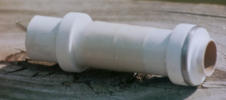| Manufacturer: | Modification |
 Brief:
Brief:
An engineering exercise to test the flight characteristics and durability of the Estes R2D2 rocket by upgrading to a 24mm motor mount.
Modifications:
The only tools required are ones that every modeler has: an Xacto knife or similar, a ruler (in my case metric, because I don't understand that English feet, pounds, ounces stuff), and a LOT of 30 minute epoxy.
Our club requires that anything over a C motor have a 5mm launch rod, so simply hacking off the original cast-in-plastic launch lugs and epoxying on a new 2" launch lug was simple.
Construction:
I used approximately 1 inch of the original 18mm motor tube, coupled to a 24mm tube for the remainder of the "motor pod." All that was required to adapt this to the styrene plastic adaptor was a little Xacto knifing and some coarse sandpaper, and LOTS of epoxy.
 The flimsy plastic fins were deemed too wobbly to handle the thrust of an E motor, so 1/8" balsa was epoxied to the flimsy plastic after roughing up the surface. Finally, to keep the balsa from charring in flight, the balsa was coated in aluminum foil, again held in place with a liberal coating of 30 minute epoxy. The result was a very heat resistant and strong fin assembly. The R2 tends to char the fins in flight, due to the extremely short polar moments of the stubby body. No problem anymore!
The flimsy plastic fins were deemed too wobbly to handle the thrust of an E motor, so 1/8" balsa was epoxied to the flimsy plastic after roughing up the surface. Finally, to keep the balsa from charring in flight, the balsa was coated in aluminum foil, again held in place with a liberal coating of 30 minute epoxy. The result was a very heat resistant and strong fin assembly. The R2 tends to char the fins in flight, due to the extremely short polar moments of the stubby body. No problem anymore! 
The extra weight of the 24mm tube and balsa reinforced fins necessitated weight added to the nose area. Since this area is hollow, there is sufficient room for it. Surprisingly, the $0.03 solution was to epoxy three pennies to the top bulkhead. The result is perfect stability; exactly that of the original unmodified R2.
The R2's weak point has always been the wacky rear deployment `chute. About 3 feet of Kevlar was substituted for the original shock cord, and a 1/8" hole was drilled into the bottom of R2. This allowed the Kevlar to be stuffed inside the hollow body, instead of being wrapped around the motor pod, like Estes originally designed. The other end of the Kevlar was attached to the plastic adaptor on the aft end of the motor pod. The results were mixed; the system performed well, but since R2 was still travelling at a pretty good speed when the ejection charge blew out the motor pod, the mylar `chute shredded, and R2 pranged. Hard. The debris was gathered and examined, and the damage was deemed very minor. He'll fly again soon, but with much stronger Kevlar and a nylon parachute.
All the parts in all of the Estes R2D2 kits I have built have been present and fit well, with the notable exception of the fins. They are lousy, warped from the factory, and break after one or two flights. I strongly recommend building your own out of balsa or G10, or reinforcing them with thin balsa like I did. If using a B or C motor, CA will hold it together just fine. Anything stronger and a liberal amount of epoxy is needed.
Flight:
My kids each have an R2, and they flew decently on a C6-5, and better on a C5-3. Never fly this model on a windy day! The rear motor pod ejection system is pitiful, and has never worked. Not once in 6 flights. No wadding is required, but cleaning out the inner tube with a toothbrush is necessary after each flight, or the pod will get stuck.
Recovery on a D12-5 is about near apogee, though an E15-7W it may still be cruising at a good bit of speed at ejection. Expect it to almost disappear on an E motor. Build it adhering as closely to the Estes instructions as possible, modifying as little as necessary. I built mine a little on the heavy side so it would last a long, long time. The flights are arrow straight, and really get moving on an E motor, though performance on a D12-5 is nothing to sneeze at.
Summary:
The main pros of the kit are ease of assembly (about an hour) and the uniqueness of the kit. The cons are related to the crummy fins and the horrible rear pod ejection system. I rate the ejection system about a 1. Future R2s will feature a true nose cone- another engineering challenge I look forward to tackling.
Other:
Epoxy and balsa can really stiffen flimsy plastic parts!
#Related Reviews
Related Products
 |
 |
Ken E. Coyote (March 10, 2015)
Hey Ken, Great review and mod! One question though...how did you manage to fit the chute into R2 when the tube is now the larger 24mm? Space already seemed quite sparse in the stock R2 and there seems to be half as much space with a 24mm main pod tube.
Ken Johnson (June 4, 2015)
I really don't remember a great deal about the construction, since it's been a while (the kid in the picture holding the rocket now has 4 kids of his own!) but I do recall using a professionally built nylon parachute and wrapped it tightly around the motor tube. Sadly this rocket flew awesomely but pranged hard. I put a lot of time into this thing just to get a few flights. It did all right on a D so I went for it and used a E30, which was crazy to watch.
 |
 |
Ken Johnson (March 13, 2014)
Wow, it's been years since I built this rocket (the kid in the picture has 3 kids of his own now) and I recently got the oldest grandkid into rockets. Time flies!
This rocket only survived one more flight. I put an E30 in it and it vaporized off the pad, flew straight up and disappeared. The motor pod recovered safely with a streamer, but the body was just a thousand fragments after coming back straight down.